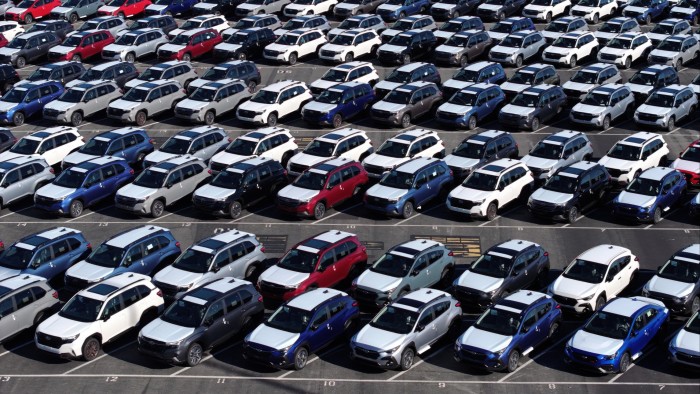Unlock the Editor’s Digest for free
Roula Khalaf, Editor of the FT, selects her favourite stories in this weekly newsletter.
Asian, European and North American countries have put Donald Trump on notice of possible retaliation against his 25 per cent car tariffs, threatening to ignite a full-blown global trade war.
Japan’s Prime Minister Shigeru Ishiba said “every option” was under consideration and South Korea promised an emergency response after the US president announced the tariffs would go into effect on April 2, when Washington is also expected to apply a range of reciprocal tariffs against America’s trading partners.
The car tariffs are Trump’s most aggressive trade policy move to date and hit shares in carmakers from Toyota to Stellantis to Porsche. The Stoxx Europe 600 Automobiles & Parts index fell 3 per cent in early trading on Thursday.
“We need to think about the best option for Japan’s national interest,” Ishiba told the country’s parliament on Thursday. “We are considering every option in order to reach the most appropriate response.”
Industry executives warned that Asian and European carmakers would be among the hardest hit. Luxury auto manufacturers, such as Jaguar Land Rover and Aston Martin, are also exposed, since they do not make cars in the US.
With $40bn of car sales to the US in 2024, Japan is the largest exporter of finished vehicles to the country after Mexico, where Japanese companies are the dominant manufacturers.
As countries across the world prepared for a deadline less than a week away, Ursula von der Leyen, president of the European Commission, said the bloc planned on “safeguarding its economic interests” while seeking a negotiated solution to the dispute.
French finance minister Eric Lombard attacked the US for “completely shifting its economic policy in a very aggressive manner”, harming both regions’ economies.
“The only solution for the EU will be to raise its own tariffs on American products,” Lombard added, telling France Inter radio that Brussels was already working on a list of targeted products.
By contrast, UK chancellor Rachel Reeves signalled the British government had no plans to retaliate, saying it was not in a “position where we want to do anything to escalate these trade wars”.
Canadian prime minister Mark Carney had earlier denounced what he described as “a direct attack” on auto sector workers.
But Trump gave no sign of backing down.
“If the European Union works with Canada in order to do economic harm to the USA, large scale Tariffs, far larger than currently planned, will be placed on them both,” he posted on his Truth Social network early on Thursday.
“FOR YEARS WE HAVE BEEN RIPPED OFF BY VIRTUALLY EVERY COUNTRY IN THE WORLD, BOTH FRIEND AND FOE. BUT THOSE DAYS ARE OVER — AMERICA FIRST!!!”
Shares in Stellantis, the owner of the Fiat, Peugeot and Chrysler brands, were down 4 per cent, Porsche dropped 3 per cent and Volkswagen fell 2 per cent.
European car-part manufacturers were also hit, with France’s Valeo down 5 per cent and Germany’s Continental 2.8 per cent lower. General Motors and Ford also fell in pre-market trading in New York.
The decision by the White House to impose duties on imported car parts as well as completed vehicles would inflict further damage, analysts said. Almost half of vehicles sold in the US are imported, and cars assembled in the US contain nearly 60 per cent foreign-sourced parts, according to research from Bernstein.
Trump has said the steep tariffs will convince foreign companies to make more of their cars in the US, boosting the country’s manufacturing industry.
Sigrid de Vries, director-general of European car industry body Acea, urged Trump to “consider the negative impact of tariffs not only on global automakers but on US domestic manufacturing as well”.
European manufacturers export up to 60 per cent of the vehicles they make in the US, according to Acea.
With additional reporting by Kana Inagaki and Mari Novak in London and Anne-Sylvaine Chassany in Berlin
Read the full article here




